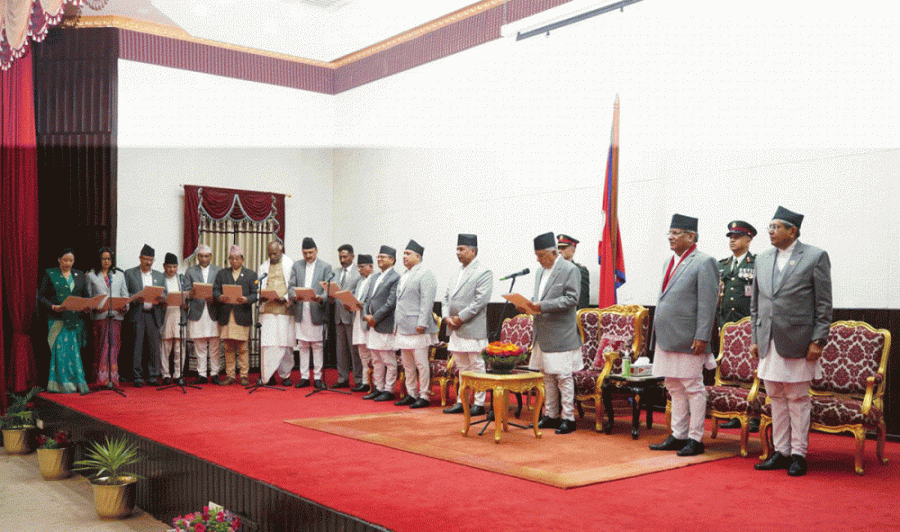National
Dahal appoints eleven ministers amid disputes, Cabinet yet to get full shape
As 4 Congress ministers take oath, rival faction stays out of process. Janamat Party minister quits over portfolio.
Tika R Pradhan
After struggling for weeks, Prime Minister Pushpa Kamal Dahal finally expanded his Cabinet on Friday, but he couldn’t resolve all the dissatisfaction among the coalition partners.
Within hours of the President administering the oath of office to four new ministers at the President’s Office, a sitting minister Abdul Khan of the Janamat Party tendered his resignation after the Ministry of Industry his party was hoping to get was given to the Nepali Congress.
With Khan quitting the Cabinet, CK Raut’s Janamat Party is officially out of the government.
While four ministers from the Congress took the oath of office, the party’s rival faction led by senior leader Shekhar Koirala and General Secretary Gagan Thapa decided not to nominate its candidates for Cabinet. The faction is unhappy with the number of ministerial posts allocated by the party’s establishment faction.
The ruling coalition has given the Congress, the largest party, eight ministries in the power-sharing deal. The Koirala-Thapa faction has said it won’t nominate its candidates for Cabinet unless given at least three ministries by the party’s establishment faction.
Another fringe party, the Aam Janata Party led by former Maoist leader Prabhu Sah, was also lobbying for a ministerial berth, but Dahal did not oblige. Sah has since expressed his dissatisfaction with Dahal.
This is the seventh Cabinet expansion since Dahal became prime minister on December 26, but the governing team is still incomplete.
With 11 new faces from seven different parties joining the Cabinet, the number of ministers, including a minister of state, has now reached 17. Sushila Sirpali Thakuri of the Maoist Centre continues as minister of state for Culture, Tourism and Civil Aviation. Still, Dahal has to fill eight ministerial positions as the Constitution envisages a maximum of 25-member Cabinet in the federal government. The prime minister continues to oversee the work of six ministries.
After recalling its only minister from the Dahal Cabinet, the Janamat Party, however, said it continues to support the government.
“We decided not to stay in the government after we could not get the ministry we wanted, but our support is still intact,” said Chandan Kumar Singh, general secretary of the Janamat Party. “Let’s see how the prime minister behaves with us.”
The Nagarik Unmukti Party’s chairperson Ranjita Shrestha, who was tipped to lead the Ministry of Youths and Sports, later agreed to be minister for Land Management, Cooperatives and Poverty Alleviation, although she had been demanding the Urban Development portfolio.
Dahal has inducted Congress Vice-President Purna Bahadur Khadka as the deputy prime minister and defence minister placing him in second highest-ranking position in the Cabinet hierarchy, while the Maoist Centre’s senior vice-chair Narayan Kaji Shrestha has had his ministry changed—from Physical Infrastructure and Transport to Home Affairs. Although Shrestha is also a deputy prime minister, he ranks after Khadka. The home ministry was vacant after the Supreme Court invalidated the citizenship of the then home minister and Rastriya Swatantra Party chair Rabi Lamichhane.
In the past, Shrestha had served both as foreign minister and home minister.
The four ministers from the Nepali Congress who took oath on Friday include Deputy Prime Minister Khadka; Prakash Sharan Mahat (Finance); Ramesh Rijal (Industry, Commerce and Supplies); and Sita Gurung (Urban Development).
Due to a rift in his party, Congress President Sher Bahadur Deuba could not nominate candidates for the four other ministries—Foreign Affairs; Health and Population; Law, Justice and Parliamentary Affairs; and Forest and Environment—allocated to the party.
The Shekhar Koirala-Gagan Thapa faction of the party warned the party’s leadership that it would not pick its ministerial nominees unless given three ministries.
“We won’t agree to anything less than three ministries,” said Gagan Thapa, one of the two general secretaries of the party.
From the Maoist Centre, deputy general secretary Shakti Basnet has been inducted as the minister for Energy, Water Resources and Irrigation and all other ministers continue with their earlier allotted portfolios, except Shrestha. Basnet had served as home minister in the past.
The Janata Samajbadi Party, which got two ministries, picked only Ashok Rai, who has been appointed Education, Science and Technology minister. As there are many aspirants, party chair Upendra Yadav could not nominate another minister from his party. Party sources claimed that both Pradip Yadav and Rajkishor Yadav have claimed the one remaining portfolio.
Likewise, the CPN (Unified Socialist) sent its vice-chair Beduram Bhusal to lead the ministry of Agriculture and Livestock Development. He is currently fourth in the Cabinet hierarchy, after Shrestha.
Bhusal is a National Assembly member and became minister for the first time. The party sent its deputy general secretary Prakash Jwala as minister for Physical Infrastructure and Transport, which was headed by Maoist Centre’s Shrestha. Jwala was earlier Finance Minister in the Karnali provincial government.
The Loktantrik Samajbadi Party sent an experienced leader, Sharat Singh Bhandari, to lead the Ministry of Labour, Employment and Social Security. He served in several governments in the past and became minister for over a dozen times starting from the pre-1990 Panchayat-era.
Chairman of the Nepal Samajbadi Party Mahindra Raya Yadav will lead the Ministry of Women, Children and Senior Citizens.
Rekha Sharma, minister for Communication and Information Technology; Sudan Kirati, minister for Culture, Tourism and Civil Aviation; and Aman Lal Modi, minister for Federal Affairs and General Administration; continue in their respective portfolios.




 20.12°C Kathmandu
20.12°C Kathmandu















